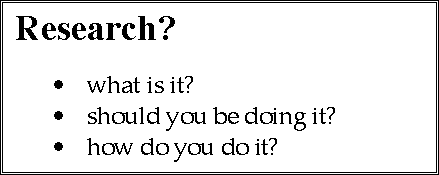
Final year projects cover such a wide range of areas and each will have its own specific techniques, methods and tricks. So, if this document dealt with specific techniques, such as experimental method or simulation, it would only be of interest to a small number of you. Instead I shall look at some of the general principles that can help in your own process of research, innovation and development.
We will first ask what research is and whether, as final year project students, you ought to be doing it anyway. After this, and forming the bulk of the document , we shall look at the process of research itself.

Pause for a moment, think of the word 'research' - what images come into your mind? Don't try to define it, just think about what it means to you. Write down a few ideas below.

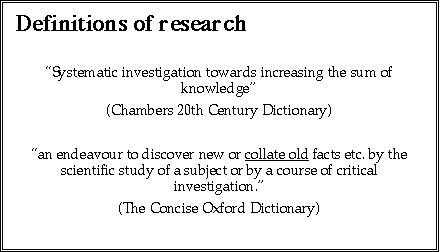
Look at the two dictionary definitions above. Which one, if either, is closest to your images of research? The first is more lofty - looking for totally new knowledge. The Oxford definition also includes the collation of existing knowledge. The image which immediately springs to my mind when I think of research although not what I do) is of Brains on Thunderbirds - the white coated scientist bent over a bubbling test tube. This fits well the Chambers definition. In contrast, the 'collate old facts' definition suggests heads bent over old manuscripts in the British Library Reading Room.
These are just two types of research, we'll consider a few more ideas, but you may have thought of something different again.
The first of this list , the scientist, is perhaps the archetypal image of experimental research. Of course, the white coated technician is less well respected today than in the late 60's when Thunderbirds was first screened. A more acceptable modern image might be the botanist in the Amazonian rain forest, observing and discovering new creatures before they fall under the axe and are consumed by fire. Behavioural and experimental psychologists would also fall under this general heading.
The social scientist's methods are different from the laboratory (although quite similar to the botanist). They include interviews, observation and the collection of data. All of which will be needed at very least during your requirements elicitation from your client. Notice how the world of the social scientist is far less controlled than that of the laboratory or even the botanist. You can put a beetle in a 'bug box' and examine it, but social situations collapse when dissected too closely. The ecologist has similar problems.
Historical research corresponds to the British Library image, reading original sources and other peoples books and papers. Of course it does not stop there. The aim of the historian is to understand the historical processes as well as to record it. One of the key things a historian has to recognise is that all the sources are biased - written from a particular perspective by a particular person for some particular purpose. You will be faced with similar issues, albeit from modern sources.
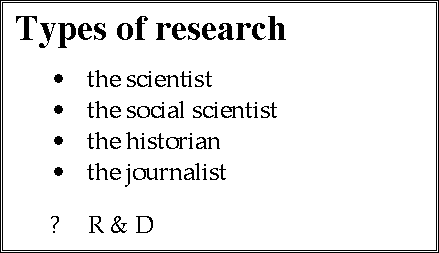
Journalists operate in a somewhat similar fashion. They do not expect to generate new knowledge (although they may occasionally generate fiction). Instead, they cull from exiting sources: people, books, other newspaper articles etc., in order to write about their chosen subject. Note the range of sources they must draw on. Also note that they will not attempt to thoroughly understand the subject they are writing about, nor do they attempt total coverage of the area. They have a goal, to write an article, and they find out just enough to do that job. The academic must take a deeper and wider perspective than this, but do not underestimate the skill of the journalists. When some event happens they have to find out enough within a few hours to be able to write cogently about it.
Finally we have industrial Research and Development. What is the research element in that. Well, some firms do have 'blue skies' research laboratories whose job is to find exciting new things, rather like (but better resourced) than a University research atmosphere. However, most do not have sufficient spare resources to use for this sort of enterprise. Instead, the job of the commercial researcher is to draw on existing knowledge and bring it to bear on a particular problem. This may involve creating something new, but usually by some adaptation of an existing solution. Like the journalist, the industrial researcher is very goal directed, but has to do more. The journalist merely has to gather enough information to write the article, the industrial researcher must understand the information in order to apply it to a new situation, that is, the product under development.
Clearly, the R & D situation is closest to your project as you too have a client and a product to produce. However, the situation is not identical. Your aim is not only to produce a product, but also to obtain a degree. Although your time may hardly seem leisurely, you do in fact have more 'leisure' to reflect upon the work you are doing, taking a more academic angle. In particular, this might mean being somewhat more broad in your searches for information and considering more alternatives to a problem, even after you have found a solution which works.
So, given these definitions of research and examples of researchers, should you be doing research in your project, or should that be left to the PhD students and academics. And, if you should be doing research, which of the above types should it be.
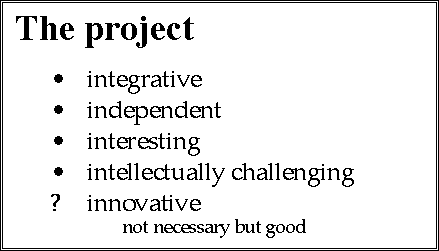
Let's think about your project in terms of some 'I' words. First it should be integrative, bringing together knowledge from different areas. In most of your courses you consider some particular aspect of computing, business or mathematics. In your project you must use knowledge from a variety of areas and sources. Some things you may already know from a course you have done. Other things might need further investigation.
The project is an independent piece of work which is interesting to you. As it is YOU doing the work, you are only expected to produce what is reasonable for a final year undergraduate.
However, as it as an academic project, part of an honours degree, it must also be intellectually challenging. Again, not the minimal solution to a problem, but one that involves significant academic work before hand and analysis of your results after. One would hope that this will also contribute to making the project interesting.
To be integrative and intellectually challenging the project must clearly involve research in the sense of 'collating old facts'. That is, aspects of the British Library image combined with the focused attitude of industrial R & D.
But, the crunch, should the project be innovative - breaking new ground, extending the sum of human knowledge, generating new and novel solutions?
Well, it would obviously be nice to develop some new algorithm or discover some new fact about IT, and the best projects will involve some level of innovation, but this is an undergraduate and not a research degree, so it is not necessary. On the other hand, it would be hard to apply even standard techniques to a new problem without there being something novel about it. Every situation is slightly different and you will have to use a level of ingenuity (another 'I' word) in dealing with it.
So, given you should be doing some research, how do you go about it? You all know the old saying: "you should learn from your mistakes". Indeed, this will be an important part of your final report. You will have to reflect upon what did and did not work. You will be expected to diagnose your problems and learn from them. However, you do not have enough time to make too many mistakes, so you should avoid as many as possible.
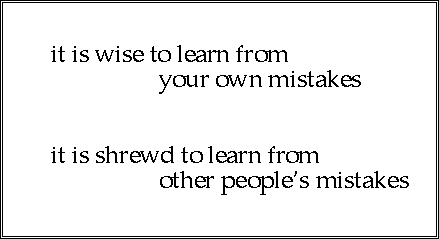
How do you avoid making your own mistakes? Well although it is good to learn from your own mistakes, it is shrewd to learn from other peoples mistakes. Find out what other people have done right and done wrong before making the same mistakes or even working hard to discover the same good things.
To do this you must study other people's work before embarking on your own - that is, more research. But it is not all of the British Library (or even Huddersfield Library) kind.
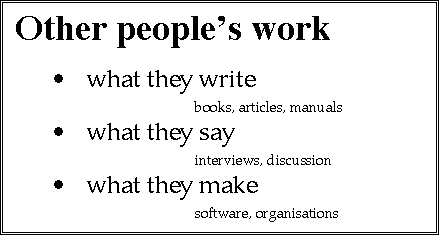
You obviously need to read what other people have written: books, academic papers, newspaper articles etc. In addition you need to consider what they say by interviews, discussions etc. Finally, examine what they make - in your context primarily software, but also possibly the organisational structures, paper based systems etc.
Alan Dix 12/8/97